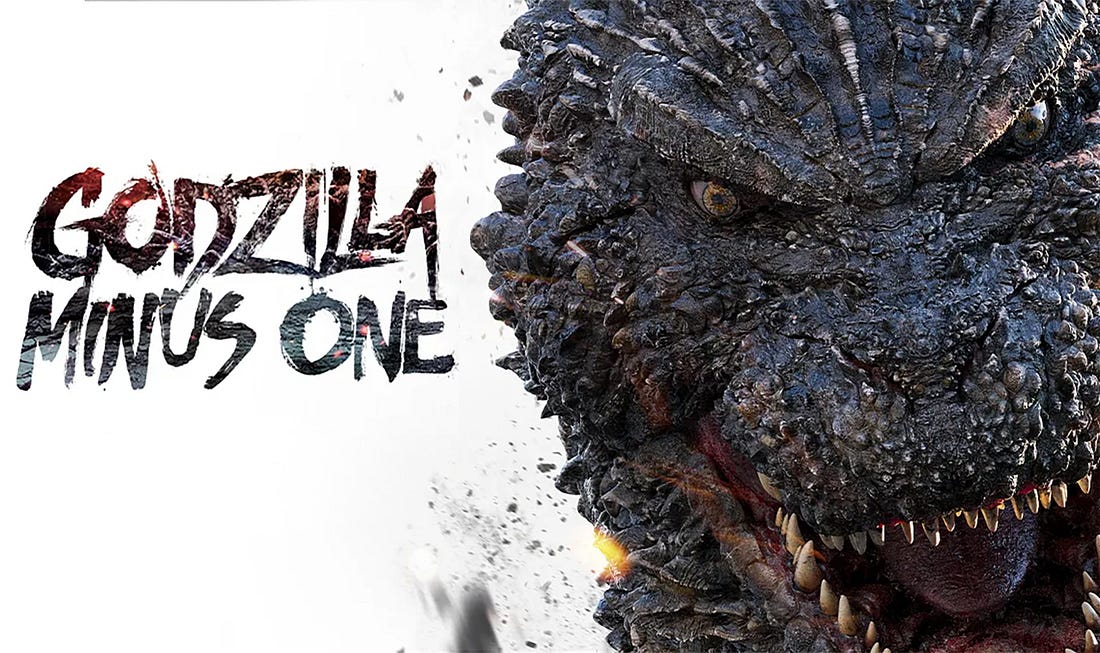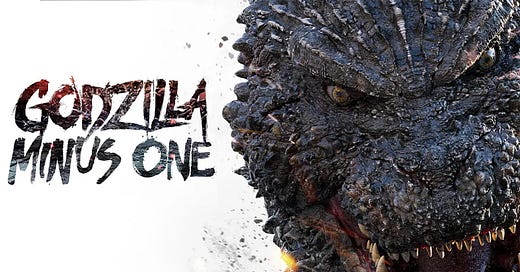Godzilla Minus One, Written and Directed by Takashi Yamazaki
Although Godzilla Minus One is, on the surface, the story of one man's search for closure, its meaning is much deeper than that.

Starring Ryunosuke Kamiki, Minami Hamabe, and Yuki Yamada
Distributed by Toho Co. Ltd.
Running Time: 125 minutes
Rated PG-13 for creature violence and action
Author's note: This review contains spoilers.
Toward the end of World War II, when it became clear that Japan was losing, the Imperial Japanese Navy formed kamikaze special attack units. The pilots selected for these units were expected to kill themselves by deliberately crashing their aircraft into American warships. The military culture of Imperial Japan regarded this as an honorable death—and as the pilots’ duty. For a kamikaze pilot to put his own life ahead of the Empire by abandoning this “duty” was considered a grievous dishonor.
Beginning close to the end of the war, Godzilla Minus One follows a fictional kamikaze pilot, Kōichi Shikishima (Ryunosuke Kamiki), who deserts his mission and lands his plane at a repair base on a remote island. The mechanics find nothing wrong with the plane and accuse him of cowardice, but before anyone can act, Godzilla attacks the island. Shikishima is paralyzed by fear when he has a chance to shoot at the monster, and only he and one other man are left alive after Godzilla returns to the ocean. The war ends soon after, and Shikishima is left burdened with feelings of guilt and dishonor. For him, “the war is not over,” and he won’t let himself settle down with a girl he falls for until he has “redeemed himself” for abandoning his kamikaze assignment.
Although Godzilla Minus One is, on the surface, the story of Shikishima’s search for closure, its meaning is much deeper than that. It is a principled attack on the very idea that a man is duty-bound to sacrifice his life for his country.
After the war, Godzilla begins to devastate cities in mainland Japan. When the Japanese and American governments refuse to fight him (afraid that the Soviets will view a military operation in the Pacific as an act of war), a group of civilians, mostly Imperial Navy veterans, organize a defense. Among them is Kenji Noda (Hidetaka Yoshioka), whose character best conveys the moral message of the film. Addressing the war-weary volunteers reluctant to risk their lives again, Noda takes aim at the sacrificial ethics embedded in Japanese culture at the time. “In this country, we have treated life far too cheaply,” he says. Breaking with that tradition, he tells them that he hopes to defeat Godzilla without a single casualty, saying, “The preservation of life is infinitely more important than the pursuit of an honorable death.”1
Choosing life is really what Godzilla Minus One is all about; Noda rejects the philosophy of sacrifice, insisting that the fight against Godzilla is a fight for life, and that people should fight out of choice, not a sense of duty. Further, Noda encourages Shikishima to choose living his life over wallowing in his guilt—guilt that is unearned, because Shikishima never chose to be a kamikaze pilot. Whereas a more traditional story might call for Shikishima to redeem himself by sacrificing his life, Godzilla Minus One instead delivers a wonderfully unexpected life-affirming twist.
Another commendable aspect of the film’s philosophy—and a classic Godzilla trope—is the way that the characters use their intelligence, rather than mere physical might, to fight against the monster. Noda’s plan for defeating Godzilla (who is impervious to most traditional weaponry) is so innovative that he must give a classroom-style demonstration of the science involved to convince the volunteers to go along with it. The movie not only upholds reason and science; it even teaches a little of it.
Complementing this film’s excellent moral theme is a powerful score that gives appropriate gravitas to both drama and action scenes. The visual effects are, on the whole, outstanding, and the creative filmography of the action sequences makes Godzilla’s appearance (which is often somewhat comical in other films) genuinely frightening.
Godzilla Minus One is no run-of-the-mill monster movie. It is an outstanding story about the value of human life and the immorality of sacrificing it.




